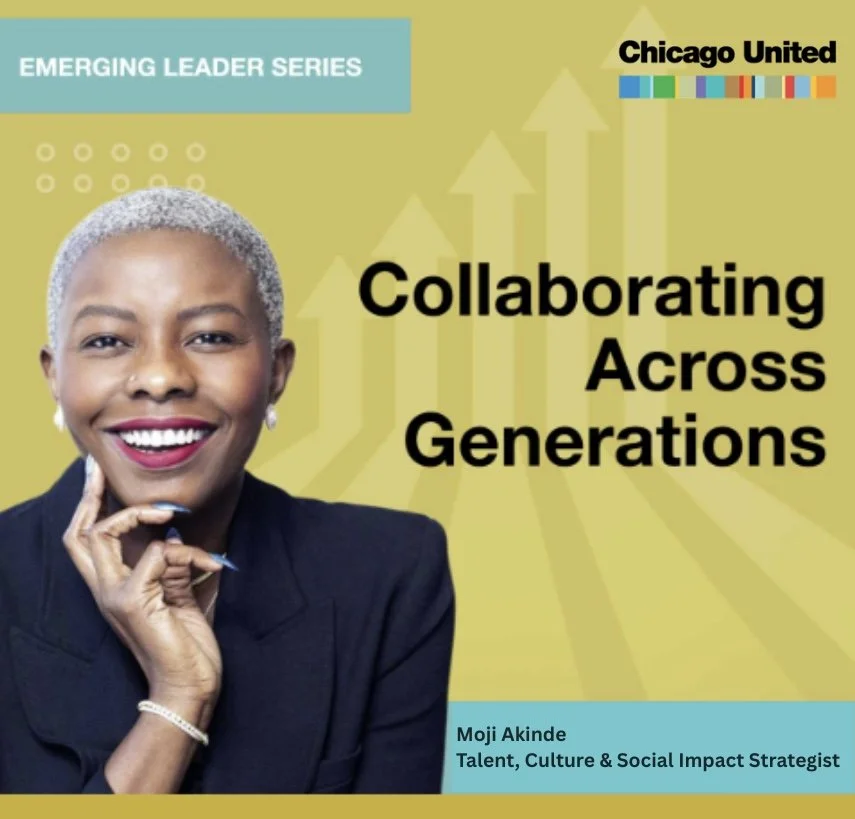Leading Across Generations: Building the Future Without Breaking Each Other
In late July, I had the absolute pleasure of partnering once again with Chicago United for their Emerging Leaders Series, this time guiding a session titled “Collaborating Across Generations in the Workplace.”
If you’ve ever had a conversation with me about the future of work, you know this topic is personal. Multigenerational collaboration is a leadership imperative that in this climate, is starting to become an ethical one.
I have been seeing a troubling trend lately of posts and narratives from seasoned professionals, some who even identify as “inclusive leaders”, mocking Gen Z in ways that go far beyond humor. Videos imitating their speech, dismissing their values, and encouraging audiences to “have fun” in the comments mimicking them.
If any of these posts targeted any other demographic, HR teams around the country would be swiftly involved. So here’s the question that troubles me: What type of leader publicly ridicules the very generation they’re responsible for developing?
Gen Z will make up nearly 30% of the workforce in just a few years. But they’re not the future workforce, they’re already here. And when they see leaders who reduce them to caricatures, what message are they expected to interpret from those interactions? And why would they want to work for leaders who refuse to respect and understand them?
The Power of Generational Collaboration
Leadership is not about nostalgia for “how we used to do things.” It is about modeling the behaviors we expect others to follow, and as leaders, we go first. We shape culture through our credibility, influence and trust, not our titles.
And yet, many of us forget that every single generation was once on the receiving end of these same jokes and stereotypes. Boomers were “rebels,” Gen X was “disengaged,” Millennials were “entitled.” Now Gen Z is “soft.” It is about time we stopped recycling the same tired narrative and start building a better, collaborative future together.
In the session with Chicago United, we explored how four generations – Baby Boomers, Gen X, Millennials, and Gen Z – are co-authoring the story of work. Emerging leaders today sit at the intersection of all of it; managing up to senior leaders, motivating peers, and guiding newer team members, a challenging but powerful feat.
We explored practical ways to:
Communicate authentically across generational lines without losing one’s own voice
Prioritize mutual respect for the wisdom and lived experiences each generation holds
Motivate and collaborate with teams without relying on outdated ideologies
Lead with empathy, flexibility, and most importantly, intention
From Stereotypes to Shared Humanity
We unpacked generational identity with nuance instead of stereotypes. Yes, Gen Z is values-driven, equity-minded, and allergic to performative leadership. However, every generation has passed down something essential: courage, adaptability, resilience, self-awareness. These are all human traits that transcend any one generation.
And when one of the participants said, “We don’t get to complain about leadership capability gaps in younger generations if we’re not willing to create something better with them,” the room fell silent.
Leadership across generations is an act of courage and emotional intelligence, one that does not require code-switching identities. It requires staying rooted in authenticity while learning how others listen, process, and lead.
Let younger professionals lead. Let them challenge norms. Let them speak in ways that might sound “different”, and then watch them exceed expectations. Gen Z is reimagining leadership to be more trust-based, transparent, and values-aligned. And they might just be the best thing that’s happened to workplace culture in a while.
Leaders Go First
We also had to talk about the internal work of self-awareness, because sometimes what we call “leadership style” is really just anxiety dressed up as control. And some discerning questions to ask are:
What am I actually trying to achieve?
Do I want to be right or do I want change?
Is this about impact or control?
If leaders don’t examine their triggers, they will seep into the workplace and be projected onto others who see the world differently. Courageous and inclusive leadership is a mindset, a daily practice, and a willingness to sit in discomfort long enough to grow through it.
So, to every leader reading this: If you’re constantly poking fun at another generation, ask yourself what that humor is masking. Is it fear of change? Fatigue? A need for control? And will you be courageous enough to evolve through this discomfort?
I’m deeply grateful to Chicago United for creating spaces where these conversations can happen with heart and honesty.
Here’s to the leaders shaping the future; across generations, across titles, and across what’s been done before. Let’s build a beautiful future together, without breaking each other in the process.


